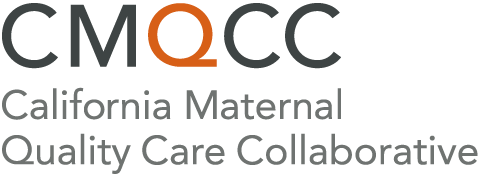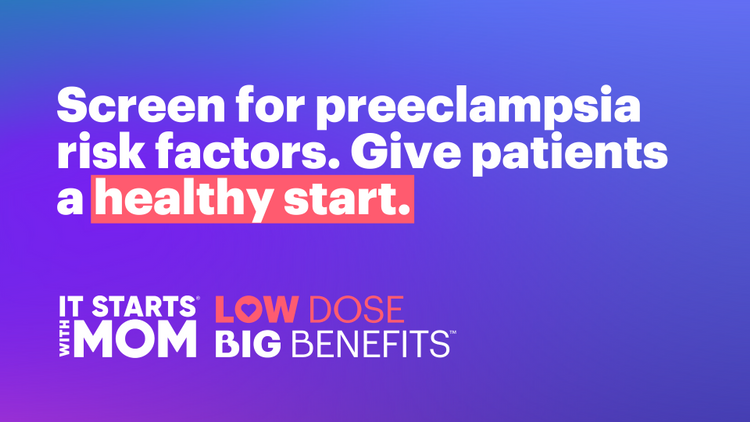
CMQCC, in partnership with March of Dimes, select hospitals statewide, and community organizations, is collaborating to promote the use of daily low-dose aspirin for women and birthing people at risk for preeclampsia. Low-dose aspirin, as recommended by a healthcare provider, is the only known effective solution to prevent preeclampsia.
About Preeclampsia
According to the American College of Obstetricians and Gynecologists, preeclampsia is a disorder of pregnancy associated with new-onset hypertension, which occurs most often after 20 weeks of gestation and frequently near term. It affects about 4% of pregnancies in the United States and accounts for 6% of preterm births. Black birthing individuals are at greater risk for developing preeclampsia, due to heightened experiences of racism, further exacerbating disparities in maternal health outcomes.
Resources for Pregnant Women/People
- March of Dimes "Learn about low-dose aspirin during pregnancy"
- Patient Information Sheet: "Let's Do Aspirin! To keep baby and you safe from preeclampsia" in English and Spanish
- Patient Poster: "Prevent Preeclampsia with Low-Dose Aspirin" for use in clinics and waiting rooms in English and Spanish
- Patient Scorecard: "Should I do aspirin...to keep me and my baby safe?" in English and Spanish
For Prenatal Healthcare Clinicians (Inpatient & Outpatient)
Low-Dose Aspirin Initiative: Collaborative Round 3
CMQCC, in collaboration with March of Dimes, is excited to invite organizations across California to join us in the Low-Dose Aspirin Initiative.
Goal: To implement a patient- and community-engaged quality improvement (QI) project aimed at increasing low-dose aspirin uptake and adherence for preeclampsia prevention.
When: Beginning in late June 2025
Who: California healthcare organizations that provide prenatal care or see patients early in pregnancy OR California community-based organizations that work with pregnant individuals
Structure: This initiative will have a sprint collaborative structure, to provide tailored support for implementing a QI project to improve low-dose aspirin uptake and adherence. The sprint collaborative will last six months with meetings held twice a month.
Curriculum: March of Dimes and CMQCC are publishing the Low-Dose Aspirin Implementation Guide in 2025, which will serve as the curriculum for this collaborative, including clinical and QI principles and supportive tools. Topics include:
- Team building and project planning
- Patient and community engagement
-
Workflow improvements to include clinical best practices:
- Screening for preeclampsia
- Patient education
- Low-Dose Aspirin prescription
- Assessment of adherence
- Data planning for effective QI
- Spread and Sustainability
For questions or interest, contact:
- Sarah Vaillancourt, DNP, WHNP-BC, RN, CMQCC Outpatient Clinical Lead, info@cmqcc.org
- Lindsay du Plessis, DrPH, MPH, CMQCC Community Engagement Lead, info@cmqcc.org
Resources for Prenatal Healthcare Clinicians
- Communicating with Patients: How to Talk About Preeclampsia and Low Dose Aspirin with Patients
- Continuing Medical Education: Low Dose Big Benefits: Raising Awareness of Low Dose Aspirin to Reduce the Negative Impacts of Preeclampsia (Free offering, 1.0 CME, CPE, and CNE)
- Findings: U.S. Preventive Task Force "Final Recommendation Preeclampsia Screening"
- Patient Information Sheet: "Let's Do Aspirin! To keep baby and you safe from preeclampsia" in English and Spanish
- Patient Poster: "Prevent Preeclampsia with Low-Dose Aspirin" for use in clinics and waiting rooms in English and Spanish
- Patient Scorecard: "Should I do aspirin...to keep me and my baby safe?" in English and Spanish
- Slide Set: Mini Grand Rounds: Low-dose Aspirin (LDA) Campaign to Reduce Preeclampsia and Related Preterm Birth
- Toolkit for Hospitals: Improving Health Care Response to Hypertensive Disorders of Pregnancy Toolkit (an evidence-based QI toolkit includes a section on low-dose aspirin)
- Webinar Series:
Funding Acknowledgement
This work is generously funded by March of Dimes.
Shareable Resources from March of Dimes
Learn more about March of Dimes’ Low Dose, Big Benefits campaign.



